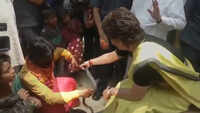
Hyderabad: The National Research Centre on Meat, which is screening butchers in Hyderabad and Delhi, revealed that five to eight per cent of them have antibodies for zoonotic diseases like Brucellosis and Leptospirosis.
Scientists studying zoonotic diseases among butchers in slaughter houses and meat selling shops said that infections can be spread to the family members of the butchers as well as consumers. As many as 150 blood samples were collected from butchers in Hyderabad and Delhi by NRCM scientists and tested as part of the project to assess the zero prevalence of occupational health and food safety risks among butchers.
NRCM got ethical clearance for collection of human samples from the Institutional Ethical Committee of Kamineni Academy of Medical Sciences and Research Centre, Hyderabad. Researches also collected data on personal hygiene and other epidemiological information. A total of 5 (5.49%) samples were positive for antibodies against brucellosis by Rose Bengal Plate Test and ELISA.
“Leptospiris spread through rodents and mices near the meat selling shops as the urine of rodent spreads it. We have supplied aprons and gloves to them but most of the butchers refused to use them,” said Barbuddhe.
It was found in the investigation none of them had previously taken tests for the zoonotic diseases. “As per FSSAI rules, the company or government agency that engages them have to do regular medical check-up but it is not happening. Slaughter houses are also not doing it,” said Barbuddhe.
Researchers also found skin infections in those handling sheep. “While slaughtering the animal, if it touches the ground, the meat gets contaminated. In most meat selling shops, they don’t clean the floor properly. Food borne disease is likely in case if a buyer consumes such meat. Storage is another important issue. With their dirty clothes, the butchers go home due to which children and other family members get affected,” said Barbuddhe.
The study also found that butchers get injuries on hands and fingers including amputation but these injures are not attended to properly.
Greater Hyderabad Municipal Corporation authorities have fined almost half of the meat selling shops in the city. GHMC Chief Veterinary Officer Dr Venkateswara Reddy told TOI that out of the 3354 meat shops in the city, 1518 were prosecuted and around Rs, 1.43 lakh fine collected from them. “We have seized 2708 kilograms of mutton and 10218 kgs of beef and prosecuted them in the court. They were prosecuted for not maintaining hygiene in the meat selling shops.”
In Hyderabad, NRCM conducted two awareness camps for butchers and the next one will be held on May 15.
Scientists studying zoonotic diseases among butchers in slaughter houses and meat selling shops said that infections can be spread to the family members of the butchers as well as consumers. As many as 150 blood samples were collected from butchers in Hyderabad and Delhi by NRCM scientists and tested as part of the project to assess the zero prevalence of occupational health and food safety risks among butchers.
S B Barbuddhe, NRCM Principal Investigator of the research, told TOI: “We have screened the butchers for the two zoonotice diseases and found five per cent of them have anitbodies for Brucellosis and 7 to 8 per cent for Leptosprissil. This means that they were exposed to the infection at some point of time in their life. We are now going to conduct screening of butchers in Tamilnadu and Maharasthra.”
NRCM got ethical clearance for collection of human samples from the Institutional Ethical Committee of Kamineni Academy of Medical Sciences and Research Centre, Hyderabad. Researches also collected data on personal hygiene and other epidemiological information. A total of 5 (5.49%) samples were positive for antibodies against brucellosis by Rose Bengal Plate Test and ELISA.
“Leptospiris spread through rodents and mices near the meat selling shops as the urine of rodent spreads it. We have supplied aprons and gloves to them but most of the butchers refused to use them,” said Barbuddhe.
It was found in the investigation none of them had previously taken tests for the zoonotic diseases. “As per FSSAI rules, the company or government agency that engages them have to do regular medical check-up but it is not happening. Slaughter houses are also not doing it,” said Barbuddhe.
Researchers also found skin infections in those handling sheep. “While slaughtering the animal, if it touches the ground, the meat gets contaminated. In most meat selling shops, they don’t clean the floor properly. Food borne disease is likely in case if a buyer consumes such meat. Storage is another important issue. With their dirty clothes, the butchers go home due to which children and other family members get affected,” said Barbuddhe.
The study also found that butchers get injuries on hands and fingers including amputation but these injures are not attended to properly.
Greater Hyderabad Municipal Corporation authorities have fined almost half of the meat selling shops in the city. GHMC Chief Veterinary Officer Dr Venkateswara Reddy told TOI that out of the 3354 meat shops in the city, 1518 were prosecuted and around Rs, 1.43 lakh fine collected from them. “We have seized 2708 kilograms of mutton and 10218 kgs of beef and prosecuted them in the court. They were prosecuted for not maintaining hygiene in the meat selling shops.”
In Hyderabad, NRCM conducted two awareness camps for butchers and the next one will be held on May 15.
Download The Times of India News App for Latest India News.
#ElectionsWithTimes
more from times of india news
Elections 2019

Trending Topics
LATEST VIDEOS
More from TOI
Navbharat Times
Featured Today in Travel
Quick Links
Rajasthan election 2019Andhra Lok Sabha electionGujarat Election 2019Karnataka Election 2019MP Lok Sabha electionMaharashtra election 2019West Bengal Lok SabhaTamil Nadu election 2019UP Election 2019Bihar election 2019UP Election DateAndhra Election DateBihar Election DateAndhra Assembly ElectionLok SabhaMP Election DateMaharashtra Election DateShiv SenaYSRCPTDPWB Election DateJDUCongressBJP newsGujarat Election DateSC ST ActUIDAIIndian ArmyISRO newsSupreme CourtRajasthan Election DateTelangana Election DateTamilrockers 2018Uttarakhand newsSikkim newsOrrisa newsKarnataka Election DateNagaland newsSatta KingManipur newsMeghalaya news
Get the app










